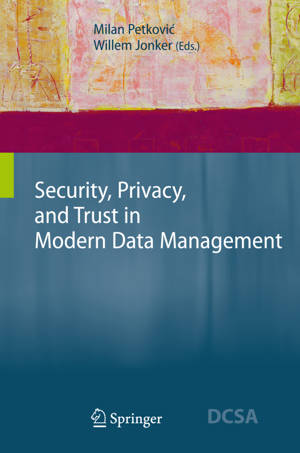
- Afhalen na 1 uur in een winkel met voorraad
- Gratis thuislevering in België vanaf € 30
- Ruim aanbod met 7 miljoen producten
- Afhalen na 1 uur in een winkel met voorraad
- Gratis thuislevering in België vanaf € 30
- Ruim aanbod met 7 miljoen producten
Zoeken
Security, Privacy, and Trust in Modern Data Management
€ 121,45
+ 242 punten
Omschrijving
Advances in information and communication technologies continue to p- vide new means of conducting remote transactions. Services facilitated by these technologies are spreading increasingly into our commercial and private spheres. For many people, these services have changed the way they work, communicate, shop, arrange travel, etc. Remote transactions, however, may also open possibilities for fraud and other types of misuse. Hence, the requi- ment to authorize transactions may arise. Authorization may in turn call for some kind of user authentication. When users have to provide personal inf- mation to access services, they literally leave a part of their life on record. As the number of sites where such records are left increases, so does the d- ger of misuse. So-called identity theft has become a pervasive problem, and a general feeling of unease and lack of trust may dissuade people from using the services on o?er. This, inanutshell, isoneofthemajorchallengesinsecurityengineering- day. How to provide servicesto individuals securelywithout making undue - cursions into their privacy at the same time. Decisions on the limits of privacy intrusions - or privacy protection, for that matter - are ultimately political decisions. Research can de?ne the design space in which service providers and regulators may try to ?nd acceptable tradeo's between security and privacy.
Specificaties
Betrokkenen
- Uitgeverij:
Inhoud
- Aantal bladzijden:
- 472
- Taal:
- Engels
- Reeks:
Eigenschappen
- Productcode (EAN):
- 9783642089268
- Verschijningsdatum:
- 18/11/2010
- Uitvoering:
- Paperback
- Formaat:
- Trade paperback (VS)
- Afmetingen:
- 156 mm x 234 mm
- Gewicht:
- 689 g

Alleen bij Standaard Boekhandel
+ 242 punten op je klantenkaart van Standaard Boekhandel
Beoordelingen
We publiceren alleen reviews die voldoen aan de voorwaarden voor reviews. Bekijk onze voorwaarden voor reviews.










